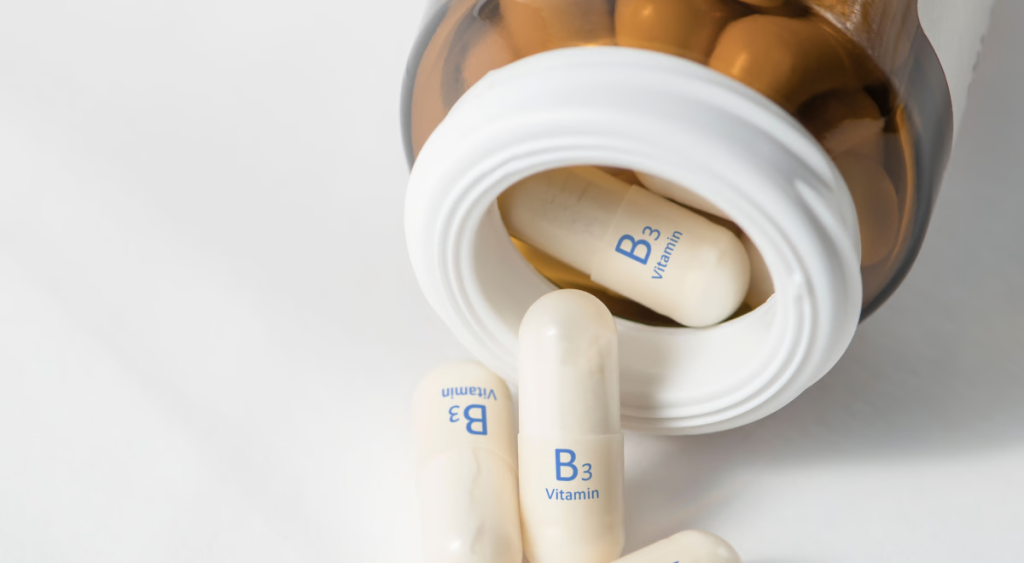Form of Vitamin B3 Shows Promise in Managing Parkinson’s Disease
Form of Vitamin B3 Shows Promise in Managing Parkinson’s Disease

Parkinson’s disease affects more than 10 million people worldwide and currently has no known cure. However, recent research has shown promising results in using a form of vitamin B3, called nicotinamide riboside (NR), to manage the symptoms of Parkinson’s. In this article, we will explore the findings of a phase 1 clinical trial that investigated the effects of NR supplementation on individuals with Parkinson’s disease. We will also discuss the potential benefits of NR and its role in cellular energy metabolism, mitochondrial function, and DNA repair.
Understanding Parkinson’s Disease
Parkinson’s disease is a neurodegenerative disorder that primarily affects the brain’s ability to produce dopamine, a neurotransmitter responsible for controlling movement. The disease is characterized by motor symptoms such as tremors, stiffness, and slow movement, as well as non-motor symptoms like cognitive impairment and depression. While there is no cure for Parkinson’s disease, current treatments focus on managing symptoms and improving the quality of life for patients.
Exploring the Potential of Nicotinamide Riboside
Nicotinamide riboside (NR) is a form of vitamin B3 that has gained attention in recent years for its potential therapeutic effects on various health conditions, including Parkinson’s disease. NR is a precursor to nicotinamide adenine dinucleotide (NAD+), an essential coenzyme involved in multiple cellular processes, including energy metabolism, mitochondrial function, gene expression regulation, and DNA repair.

Previous research has suggested that individuals with Parkinson’s disease may have a deficiency in NAD+ levels, which can contribute to abnormal energy metabolism and mitochondrial dysfunction in the brain. Increasing NAD+ levels through NR supplementation may help address these underlying issues and potentially alleviate Parkinson’s symptoms.
Phase 1 Clinical Trial: Assessing NR Supplementation in Parkinson’s Disease
A phase 1 clinical trial was conducted to investigate the effects of NR supplementation on individuals with Parkinson’s disease. The study included 20 participants with idiopathic Parkinson’s disease who received either 3,000 milligrams (mg) of NR in oral supplement form or a placebo daily for four consecutive weeks.

During the trial, the researchers assessed the participants based on clinical and molecular measures, electrocardiograms, and the severity of Parkinson’s symptoms using the Movement Disorder Society Unified Parkinson’s Disease Rating Scale (MDS-UPDRS). The primary objective was to evaluate the short-term safety of high-dose NR supplementation.
Results of the Clinical Trial
The phase 1 clinical trial yielded several significant findings regarding NR supplementation and its potential benefits for individuals with Parkinson’s disease. The researchers observed that NR supplementation significantly increased NAD+ levels and modified the NAD+ metabolome in whole blood compared to the placebo group.
Furthermore, the study reported that high-dose NR supplementation was safe and well-tolerated by the participants. They did not experience any adverse metabolic effects after 30 days of supplementation. Additionally, the NR supplementation was associated with a notable improvement in clinical symptoms of Parkinson’s disease, as measured by the MDS-UPDRS.
Implications and Future Directions
While the phase 1 clinical trial demonstrated the short-term safety and potential symptomatic benefits of NR supplementation in Parkinson’s disease, further research is needed to establish its long-term efficacy and safety. The study authors emphasize the necessity of larger clinical trials to explore higher-dose regimens and determine the optimal duration of NR supplementation.
The researchers are currently conducting the NO-PARK phase 2/3 study, which involves 400 individuals with Parkinson’s disease. This study aims to provide more conclusive evidence on the therapeutic potential of NR. The results of the NO-PARK study are expected to be available by the end of 2024.
Expert Opinions and Insights
Experts in the field of Parkinson’s disease have expressed their interest in the findings of the phase 1 clinical trial. Dr. Rocco DiPaola, a movement disorders neurologist, believes that NR supplementation offers a potential treatment that may help slow the progression of Parkinson’s disease and prevent long-term complications. However, he highlights the need for larger-scale trials with longer treatment durations to further establish the safety and neuroprotective benefits of NR.
Dr. Daniel Truong, a neurologist and medical director, shares similar sentiments and emphasizes the importance of replicating and expanding upon the results in larger, longer-term trials. He is intrigued by the proposed mechanism of action involving the increase in NAD+ levels and its potential neuroprotective effects. Dr. Truong suggests that integrating NR supplementation into current treatment protocols for Parkinson’s disease could be a promising avenue for future research.
Conclusion
The phase 1 clinical trial on NR supplementation for Parkinson’s disease has provided encouraging results regarding the safety and potential symptomatic benefits of this form of vitamin B3. While further research is needed to establish its long-term efficacy and safety, NR shows promise in addressing the underlying energy metabolism and mitochondrial dysfunction associated with Parkinson’s disease.
As the NO-PARK phase 2/3 study progresses, more conclusive evidence on the therapeutic potential of NR in managing Parkinson’s disease is expected. Integrating NR supplementation into current treatment protocols may offer a new avenue for improving clinical symptoms and potentially slowing disease progression. The search for effective treatments for Parkinson’s disease continues, and NR supplementation presents a promising opportunity for future therapeutic interventions.



